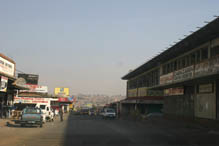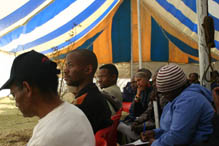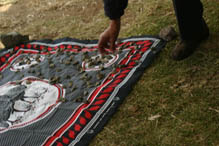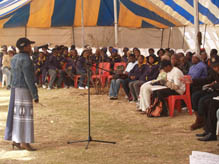 Kliptown is one of the poorest communities in Gauteng
Kliptown is one of the poorest communities in GautengAugust 8, 2008 – Despite some resistance from disaffected residents, a group gathers to learn from the past and plan a way forward
About Kliptown
On June 26, 1955, over 3 000 representatives of resistance organisations made their way through police cordons to gather on a dusty square in Kliptown, Soweto, 40km south of Johannesburg.
This was the Congress of the People, who met to draw up the Freedom Charter, an alternative vision to the repressive policies of the apartheid state.
At the time, Nelson Mandela had to stay concealed to avoid the police. On the second day, the authorities broke up the gathering, but not before the charter had been adopted as a guiding document. It remains the cornerstone of African National Congress (ANC) policy to this day, and is seen by many as the foundation of South Africa’s 1996 Constitution.
The square is now named after Walter Sisulu, who had a secret office in Kliptown when he was underground, where he was often visited by other members of the ANC. He had to watch most of the proceedings of the Congress of the People from a nearby rooftop to avoid arrest.
History was being made again when community members gathered in Kliptown on July 11, 2008 to engage in a conversation about how to prevent the further spread of HIV.
Unemployment levels are high in Kliptown, especially within the informal settlements and among women and youth. All projects implemented as part of the Greater Kliptown Development seek to maximise job and business opportunities.
Attendance
An aggressive mobilisation approach was taken for the Kliptown conversation for many reasons, among others the historical significance of Kliptown in the struggle against human rights abuse, but also because the Nelson Mandela Annual Lecture would be held at the Walter Sisulu Square a day after the conversation, on Saturday July 12 and to create sustained relationships between the NMF other partners and the community of Kliptown..
Some of the residents of Soweto, led by the Anti-Privatisation Forum, were threatening to boycott the 90th birthday celebrations for Nelson Mandela but, apart from obstructing the planned loud-hailing, there were no incidents preventing the conversation from happening. Over 320 community members attended the conversation at the Kliptown Visitors Centre on Beacon Road on Friday July 11. The event was held in a marquee.
The social mobilisation team participated in various pre-events and they were granted a platform at the Pimville ANC annual general meeting held on June 16 (where over 70 people were addressed) and a Youth for AIDS event at the Jabulani Mall held on June 26 (where over 100 young people were addressed).
Those who attended the conversation came from Eldorado Park, Kliptown, Pimville, other areas of Soweto as well as from areas along the East Rand.
The conversation
The July 11 meeting went on for three and a half hours. Paddy Nhlapo introduced the purpose and vision of the conversations, and Lesley Nkosi led the “counting your losses” and “storytelling” sessions. These are tools developed by the UN Development Programme and forming part of its Community Capacity Enhancement Programme. They are designed to create an enabling environment for a healthy conversation to take place, where individuals can express themselves without fear and reflect on how HIV has affected individuals, families and communities.
Once the community in attendance had set its own rules for running the conversation, these rules were expressed as pictures by a volunteer and pinned up on the marquee to be a constant reminder to all of the code of conduct.
The “counting your losses” exercise, when everyone was asked to place a stone on a memorial cloth to represent a life lost through AIDS, was followed by people sharing their thoughts.
• One man said: “When I heard on the radio that there would be a community conversation about HIV here in Kliptown I just had to come. When I talk about HIV and AIDS I am talking about something I have gone through myself. I have been bedridden at Helen Joseph Hospital six times. While I was there, I told myself that I would not die like a coward. I was thin and weak and almost dead, but I told myself that I would get up and save some lives. Even if I save one or two lives, I will be happy. Let’s stay true to one partner as young people. I want to remind young people that you don’t have to sleep around to feel good. Protect yourself and the people you love by being true to one partner.”
• A Soweto mother said: “I remember that I have lost my friend to HIV. She did not disclose her status to me or anyone until it was too late. She was already bedridden at a Hospice in Mofolo. At the time I did not have enough information about HIV or AIDS. When she left her two daughters behind with no one to look after them, they started taking on the behaviour they learned from their mother; they would sleep around for money, and that got me concerned, so I started a hospice to look after people with AIDS and to keep these children’s minds in the right places. I want to say that we should support people living with HIV and AIDS.”
• A youth from Mofolo Village said: “My aunt is living with HIV at home. People don’t even know their own status. I would like to encourage everyone to practise the A and the B instead of ABC. Abstain and be faithful to your partner and that’s the end of it.”
• A grandfather from Kliptown said: “When I first came to this meeting, I did not understand what this meeting was about. It could be for houses or something else. Now I understand and I am happy to be involved in this historical event. I lost my nephew to HIV and AIDS. He did not talk, and I want to tell everyone here that we need to break the silence. We wanted a government of national unity; now we have one, so let’s come together and unite against AIDS. The truth is we need to turn our eyes to the Lord once again and stop engaging in sex before marriage.”
The story
The facilitator asked the community to create a story, a way of creating insight, discussion and change. The outline for them to build on was the fictitious Madonsela family, whose daughter is doing badly at school, and who have noticed money and valuables going missing from the house. Eventually she collapses and is taken to hospital, where the doctors find that she has been using drugs and is HIV-positive. The family also goes to a traditional healer to find out what is happening.
At this cliffhanger point, the community was asked to break up into groups and discuss what they would do in the position of the characters. Many of their answers emphasised the need to learn from the mistakes that had been made, to find out more about HIV and AIDS and share this knowledge, and to support the girl and her family. There was a lively discussion about the traditional healer’s role in the drama.
The community then nominated representatives to carry forward the plans decided on by the people of Kliptown.
Difficulties and challenges encountered
There was resistance to the Nelson Mandela Foundation’s initiatives in the Kliptown community during the week of the conversation because the residents were unhappy about service delivery and were desperate to vent their frustrations. This compromised the attendance at Kliptown.
Alcoholism is rife in the community of Kliptown and some of the community members came drunk to the conversation.
Most of the dialogue had to be held in English to accommodate everyone in the marquee. Most people spoke Afrikaans and some African languages.
Factors that contributed to the success of the meeting
There was a strong media campaign around the conversation, which resulted in the following coverage:
• Soweto Today with Shailock Zunga on Soweto TV
• Pimville Urban News
• Two interviews on DJ Sbu’s breakfast show on Yfm
• Imbizo Midday Drive with DJ Sibusiso Sibisi on Thetha FM
• Jozi FM was present at the conversation to cover the day’s events
Burning issues
The methodology allows for a process that defines where the community stands and what their sentiments are. These burning issues are determined through a number of factors such as passionate expressions by community members, frequently raised issues and perspectives as well as other emotions attached.
The community of Kliptown brought up these issues as their strongest concerns:
• Support for people living with HIV and AIDS
• Communication within families; there is also a strong need for recreation in the area, especially for youth
• Awareness building and information sharing
Misconceptions
• Some of the community members still think that being diagnosed HIV-positive is an automatic death sentence. Some of the parents still believe that talking to their children about sex should be taboo. Some young people made comments that suggest that being HIV positive should be punished.
• Some of the customs are unfriendly for young women. They find themselves being groomed for marriage by their parents in their early teens. Some mothers actually groom their neighbours’ daughters for this. It is said that there is a token given to a woman who grooms good candidates by a society of like-minded thinkers in the communities.
Issues being discussed
Poverty is the source of most of the temptations and challenges faced by youth in their communities with regard to HIV and AIDS. Alcoholism and substance abuse put young people at risk as they tend to be oblivious to the messaging done around the subject.
Agreements reached
A committee was elected consisting of representatives from each of the community groups. One woman, one man and two youth were nominated to represent the community in addressing social issues, especially around HIV and AIDS. These members, along with a selected support task team from local government (Cllr Patience Petersen), youth and other members now form the Action Committee of Kliptown.
The action committee was given the proper tools to facilitate change in the identified concerns of the community.
They agreed to set up a meeting with local government to plan the way forward.
 Kliptown community listen intently
Kliptown community listen intently Community remembers the people they’ve lost to HIV/AIDS
Community remembers the people they’ve lost to HIV/AIDS Facilitator addresses the crowd
Facilitator addresses the crowd The crowd stand united, holding hands, at the Kliptown community conversation
The crowd stand united, holding hands, at the Kliptown community conversation